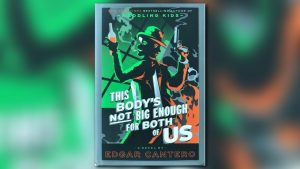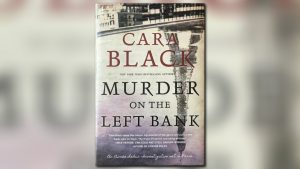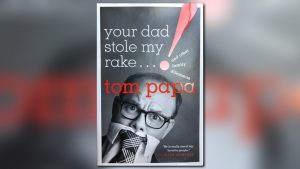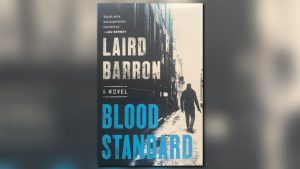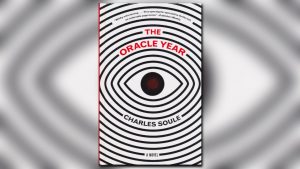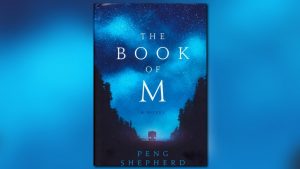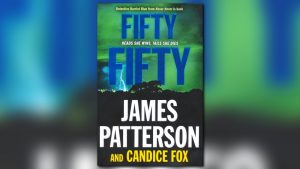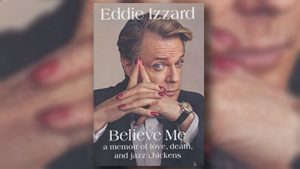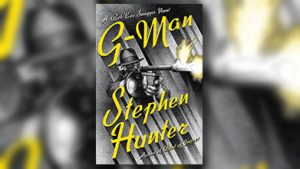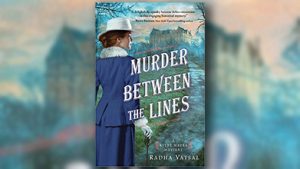Perfidia takes place in Los Angeles right after World War II. Hopes for peace had been shattered by the attack on Pearl Harbor, and a war fever and racial hatred directed at Japanese-Americans griped Los Angeles.
The murder of a Japanese family brings together four investigators to solve a crime that becomes a political storm center.
William H. Parkers, a captain of the LAPD, is consumed with dubious ideology.
Sergeant Dudley Smith is a war profiteer, while Hideo Ashida is a police chemist and the only Japanese LAPD cop.
Lastly, Kay Lake is a 21 year old amateur looking for an adventure.
Ellroy takes the reader to the edge of the abyss and the precipice of America’s ascendance.
VOICEOVER: And now, an Eight original production.
VOICEOVER: "Books & Co." is made possible by the Department of English at Arizona State University and by...
VOICEOVER: The Friends of Eight, members of Eight, Arizona PBS, who give additional gifts to support original programs. Thank you.
ALBERTO RIOS: Welcome to "Books & Co." Bienvenidos, todos. I'm your host, Alberto Ríos. We're joined today by James Ellroy, who will be talking about his newest best-selling book with a title that I just love, “Perfidia.” Or “Perfidia.” We'll talk a little bit about “Perfidia.” Welcome to James.
JAMES ELLROY: It's good to be here.
ALBERTO RIOS: Thanks for joining us. This is a big book, lots to talk about. I can't wait to hear how you got away with saying all those things you said about all those movie stars.
JAMES ELLROY: Well, they're dead! And the laws of libel in our great nation, they have no recourse. Betty Davis is a predominant character in this book and she misbehaves but within the limits of verisimilitude and Betty Davis lore. She's recognizable.
ALBERTO RIOS: Has that been a dicey road? You've done this in other books as well and I wonder what kind of reaction you get to iconographic people.
JAMES ELLROY: No. I understand historical figures. I have a good jugular instinct for real-life characters, fictional characters and I know how to mix the two.
ALBERTO RIOS: Maybe you could give us a little synopsis of a very big book.
JAMES ELLROY: Let me start at the beginning. “Perfidia,” my new novel, is the first volume of my second L.A. Quartet. The original L.A. Quartet which was published between 1987 and 1992 was comprised of four novels, “The Black Dahlia,” “The Big Nowhere,” “L.A. Confidential,” and “White Jazz.”
ALBERTO RIOS: And they got a little bit of attention, too.
JAMES ELLROY: They did and those four books were set in L.A. between 1946 and 1958. I followed that with the Underworld USA trilogy, which was published between 1995 and 2009. Those books, “American Tabloid,” “The Cold 6,000” and “Blood's a Rover,” took place in America at large between '58 and '72. What I've done in the second L.A. Quartet and the overall design of which “Perfidia” is the first volume is to take real-life and fictional characters from the first two extended bodies of work and place them in L.A. as significantly younger people during World War II. That is “Perfidia.”
ALBERTO RIOS: Okay.
ALBERTO RIOS: And it's not that you would call it a prequel. That is probably too slight of word for this because this is a work of substance that gives us a greater understanding I think of what we are about to encounter. I don’t know, in a "Star Wars" like way. We're going to go in this great circle of life that you call L.A.
JAMES ELLROY: L.A. and America at large, the grand design of the second L.A. Quartet is to take the first two bodies of work and this new body of work, first volume's just been published and create a seamless inextricable whole that is my career as a historical novelist.
ALBERTO RIOS: Kind of your own Faulkner, devising taking place in L.A.
JAMES ELLROY: I've never read Faulkner or how to pronounce that name until right now.
ALBERTO RIOS: What I'm really saying, though, is there is such complexity in all of this. I don't know that as a reader you can come to “Perfidia,” for example, and keep track of it all. That doesn't mean you can't read it. That doesn't mean you can't enjoy it but I don't know that you can sort through every nuance, who owes what debt to whom and how that all works and there's something about that web, that complexity, that I think -- and it's overwhelming often, that adds to the feeling that these characters have. Often it's a way to get off the hook; it means a lot of things.
JAMES ELLROY: You read a book like this full speed ahead. It's a very fast-paced book. And it forces you to read itself in smaller, longer increments. I want people to be disrupted from their everyday lives and read this book. This book takes place between December 6th, 1941, and the 29th. So it's 23 days, America's entrance into World War II, after the Japanese attack on Pearl Harbor. It was a binge. The book is told in real-time. Everybody is smoking cigarettes, boozing, taking drugs, having adulterous love affairs continuously. Their lives are disrupted, and it's my job as the writer to disrupt your life, the reader. And this is how I address the issue of how do you comprehend such a densely plotted book? Well, as with all large novels of violent intrigue, espionage novels, crime novels, you have to assume that the writer knows what they're doing and you have to realize that you may not know every maneuver, every single machination of the numerous characters at every moment but it's all going to work out in the end.
ALBERTO RIOS: That's exactly how I read it, and it's an interesting thing for me to hear you say read it full speed ahead. As a teacher, professor, I'm often saying slow down, let's take a look at the language, let's do this, that and the other. This asks you to do something else. And I think the sentence structure; it's that simple sentence after simple sentence after simple sentence. Before you know it, you've read 50 sentences. You're in it. You're in it and slowing down is not the way to do it.
JAMES ELLROY: No. It's a book about obsessive people in an obsessive time at an obsessive place, Los Angeles, the early days of the round ops of alleged Japanese subversives in the days immediately following Pearl Harbor.
ALBERTO RIOS: It's a kind of choreography of so many different disparate elements there. One of the forgotten ones is the Chinese. We concentrate on the Japanese and the corralling that was going to occur and so on and the Americans, obviously, and different groups that might have been there in L.A. but the Chinese are an odd, interesting and sometimes, sadly involved group.
JAMES ELLROY: You have Chinatown and little Tokyo just a few blocks apart in downtown Los Angeles. You have the LAPD detective bureau at city hall just a few blocks away. You have central station with the crime lab where one of our heroes works just a few blocks away. The Japanese family that's murdered at the center of the plot is a straight shot up the arroyo parkway, which was the first parkway completed in 1940. It's a heavily localized narrative, this book here, and it's a recipe for combustion but in addressing the Chinese, all of the racial animus in this book, however, unjustified, is entirely understandable. We know why people are coming down on the Japanese, Pearl Harbor was just bombed. We know why the Chinese hate the Japanese, it goes back centuries, over there in Asia and there's a 1937 Rape of Nanking, the Chinese are jubilant when the Japanese go to war with America because now, they can enact their centuries-old hatred against their enemy. People had outlandish beliefs in 1941 and were not averse to voicing them.
ALBERTO RIOS: The x factor in all of that was the inability of Los Angelinos to distinguish between Chinese and Japanese.
JAMES ELLROY: Yes, and there's a tragic and darkly hilarious footnote in this book. A man, a Filipino man heard a song called “Johnny the Jap Killer” on the radio and in a moment of fervor he went out and stabbed a Japanese man. Alas the man was revealed to have been Chinese.
ALBERTO RIOS: And there are more stories like that. What is interesting to me, that's an historical footnote, what we might call true. How much of it can we think of as being true? In terms of this kind of writing?
JAMES ELLROY: Doctor, you can't -- that's the one question I never answer in relation to these big historical books of mine is exactly what's real and what's not? Ideal and verisimilitude. I am looking to create something. It is the secret human infrastructure of large public events. In doing the research for “Perfidia,” I was heartened by the fact; the first month of the roundups of the allegedly subversive Japanese was, in fact, largely chaotic. And this absence of a through-line gave me that much more latitude to fictionalize.
ALBERTO RIOS: It's a very exciting idea for a writer; it's not taking license because license assumes you've got no parameters really. You've got some very interesting parameters and you're putting them together in a way that energizes us as readers, we're recognizing some names, we're recognizing some events, and you're giving us narrative in the middle of that, something cohesive where there was nothing so cohesive in its moment.
JAMES ELLROY: I set out to write a huge book about the early days of Los Angeles in World War II, focusing on the grave injustice of the Japanese internment from a range of perspectives. Dudley Smith, the demonic Irish, the villain of three of my early written but latter-set novels, now, we see him as a young man and a fledgling war profiteer. Hideo Ashida, a closeted homosexual, brilliant young Japanese-American forensic chemist. Kay Lake who in the earlier written latter-set book becomes the heroine, Black Dahlia is now a 21-year-old dilettante looking for adventure and one of the great misunderstood characters out of L.A.'s past, William H. Parker, who will go on to become the reforming chief of the LAPD. Here he is, as a 39-year-old captain with a marriage on the skids and a bad drinking problem.
ALBERTO RIOS: A great line about him where you talk about him and he has a religious affinity that is true to a number of the characters but you talk about him being sodded on communion wine.
JAMES ELLROY: He is -- there are two Catholic characters, Dudley Smith the Irishman is Catholic as is William H. Parker and for the wildly Protestant Ellroy, this was a hell of a leap, I know nothing about Irish and nothing about Catholicism.
ALBERTO RIOS: You know a lot about a lot as we start to find out in the book and one of the things, as you move forward, you've got all of this tough guy talk, and it's a mix of what you might think of as cop lingo, but also, there's a lot of racial slurs and ethnic, you know, sorts of things going on. In a contemporary climate, that's a little hard and shocking. In telling the story, you need to do that. Talk about that a little bit.
JAMES ELLROY: P.C.-ers today want racists defined as such. They want racism to be a defining characteristic. In my characters, it's no more than a casual attribute. None of the big cops in this book are what we would call active racists. They're not in nativist groups, they're not America-firsters, they're not in the silver shirts or the klans. They speak that way because it is the common language coin of the era. And people don't know, some people, how to react when someone uses a racial slur and they like this person. And the answer is it's 1941, so get used to it.
ALBERTO RIOS: Let me take a moment to remind our viewers you're watching "Books & Company," I'm your host Alberto Ríos and we're joined today by James Ellroy, talking about his newest book, “Perfidia.” Well, tell me about choosing the name. Let's talk about the song finally.
JAMES ELLROY: I love the song, Doctor, as much as you do.
ALBERTO RIOS: I do, I do.
JAMES ELLROY: I heard “Perfidia” is a big band tune. It was -- you told me in the green room, it was translated by a man named Gonzalvez, I think it was written by a Latin American, as well. It's been covered at least 16 trillion times. You and I would guess first heard it in the 1960s, early 1960s, the Ventures, rock and roll electronic guitar versions. There are numerous versions in English. It's a plaintive, sorrowful love song about betrayal. Perfidia is perfidy or betrayal in Spanish. “Perfidia,” this novel, is the story of deep and conflicted alliances in a time of outlandish belief, huge geopolitical stakes, rampant racial factionalism, betrayal and perfidy. Hence the title.
ALBERTO RIOS: And in the English version of that song, “Perfidia” is portrayed -- it is the woman's name, which is not accurate to how it is, but that kind of cultural confusion strikes me as perfect for what you're trying to do in the book, and I think it suits it. I think you do a good job of choosing something to work with, the difficult elements.
JAMES ELLROY: It was the time of lunatic populism run amok, petulantly expressed anti-Semitism uttered on the floor of the United States Senate and on the radio every day by radio demagogues, such as father Charles Cogland. People in a sizable part of the American public believed that Jews engineered the war and that they were in league both with Wall Street bankers and soviet communism, which is inexplicable to anybody with a grasp of history. And it all came out of this witch's brew which was the sustained privation of the Great Depression which, of course, existed worldwide. And so some share the wealth reds like father Cogland started out in the early '30s as social do-gooders.
ALBERTO RIOS: And they were real names, by the way.
JAMES ELLROY: Oh, yeah. And they gradually saw that the only form of socialism that was working in the world was in Nazi Germany where National Socialism was working behind the motor of anti-Semitism. Hitler gave woman breeding bonuses to create some more strapping blond, good-looking people. Hitler rebuilt the roads. Hitler was a socialist in every sense of the word. Hitler gave German workers a fair shake and gave them the month of August off so they could go to the mountains and breed and lift weights and build up their muscles so they could ultimately take over Europe for breeding room for the Arian male. People on the left wanted to breed healthy human beings. On the far right, Hitler and a lot of Soviets just wanted to build a master race. People believed this stuff. It's inexplicable today. And it all combusts in Los Angeles, which was a haven for faddists of all stripe, up through the 1930s, and then bam, the Japanese bomb Pearl Harbor, the feds had a list, fifth columnists were alleged subversives. The term derived from…
ALBERTO RIOS: Explain that.
JAMES ELLROY: Four columns of soldiers were sent out into battle, but the fifth column stayed home and performed industrial sabotage, disseminated propaganda, it was undetectable stuff so anybody could be a fifth columnist. Feds had a list, LAPD had a list, the sheriff had a list. Not many people spoke Japanese in these police agencies but boy they sure had a list and they went in there, little Tokyo and other Japanese enclaves and started seizing assets, seizing property and arresting Japanese men and women, some undoubtedly harbored allegiance to the old country, to imperial Japan. Most of them didn't. There was no habeas corpus. They did not get their day in court. The ACLU called it and properly so the greatest most sustained abrogation of civil liberties in American history. Went on for years. They were sent to internment camps in middle America in the Pacific Northwest and throughout California.
ALBERTO RIOS: You make those days, you make that information vivid and you give it to characters. You don't try to create a diatribe or an overarching narrator. You have many people speaking, and I think that's exactly the tenor of the time, those few days that you're describing and I think you do a good job of making that happen. In the midst of all of that, you do the great things that any writer does. You remember the small details as well that don't have anything necessarily to do with the plot. They are just there. You have a very sparse style so you don't do that very often and every time I encountered it, I liked it and I also liked that you weren't doing it all the time. So I had conflicted feelings. I'm talking about things like lucky logger, Bucky Beaver, Bucky, Bucky Beaver?
JAMES ELLROY: The toothpaste.
ALBERTO RIOS: Little things that just started vivify something beyond the great neon of the crisis. But yeah, all that's happening but I've got to brush my teeth and go to bed.
JAMES ELLROY: There's an art to writing properly detailed historical fiction and it's not to lay on all the detail and books like that, you can tell are overly researched and underwritten. The key period detail. For example, December 1941 in Los Angeles was a party. And the cover flap, the flap copy for that book there, the copywriter calls it the party at the edge of the abyss and the precipice of America's descendance. They were scared. As someone ruminates, those swabbies at Pearl didn't know what hit them. We could be next, hence there's a party in the opium den in Ace Quan, the tong boss's restaurant in Chinatown. There's two parties at the home of a leftist socialite named Claire DeHaven.
ALBERTO RIOS: You have a very spare style, and it's simple sentence after simple sentence, and it's a rapid-fire way to get the reader just going, going, going. How did you evolve that? Is it natural to your writing style?
JAMES ELLROY: Frank O'Connor wrote the literature that cannot be vulgarized is no literature at all and will not last. I love the American idiom. I love good, plain simple language. I love racial invective, I love Yiddish, I love black hep cat jazz musician patois. I love hard C. world spelled with K.K.K. in italics and in telling a story like this, less is more in the actual moment to moment deployment of the language. There are three third person subjective narrators in this book. Everything, even though it's third person is seen through their eyes. Dudley Smith, William H. Parker, Hideo Ashida. The fourth viewpoint is a diary, and it's Kay Lake and she's a young woman. Her style differs dramatically from the style of the three men. There's design in this, which is I want Kay lake to embody the courageous World War II generation woman and I want her to be funny and observant in a way that the men aren't.
ALBERTO RIOS: Which she does. And she does repeatedly and I think she is the counterpoint to all of that other stuff that we're hearing. She gives herself almost totally over to the danger. She is at that abyss you talked about earlier. She's part of its definition in a curious way. She doesn't know what she's playing with, she's playing with fire. She doesn't know what it's going to do to her but she jumps in.
JAMES ELLROY: Yeah, she's madcap. She's clotheshorse. She's a genius. She plays the piano rather well. She's funny. She's romantically reckless. She has more than one lover. And I love her. I think she's my most brilliant fictional creation.
ALBERTO RIOS: And we get to see her again if we're following your work. More than one lover and maybe even in one night. She plays a very interesting role in which she becomes almost the actress architect that we're going to see in that she gets to play this role, it's maybe not her, she doesn't know get.
JAMES ELLROY: She's entirely bold. She is recklessly unconscious and I spent a great deal of time perfecting her voice.
ALBERTO RIOS: Well, we've been talking today with James Ellroy, I want to thank you. We've been talking about his book “Perfidia.” You've been watching "Books & Company." I'm your host, Alberto Ríos. Please join us again next time when we'll be bringing you another good book. Thanks, James.
VOICEOVER: "Books & Company" is made possible by the Department of English at Arizona State University. And by...
VOICEOVER: The Friends of Eight, members of Eight, Arizona PBS, who give additional gifts to support original programs. Thank you.





